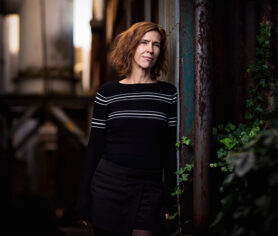About the chair patronage studies
Prof. dr. Helleke van den Braber has been appointed professor of Patronage Studies from 1 January 2020, on behalf of the Geef om Cultuur Foundation. The chair is housed in the Department of Media and Cultural Studies.
Patronage studies

The interdisciplinary field of Patronage Studies examines gift relationships between artists and cultural institutions on the one hand, and benefactors on the other. Patronage is a game of give and take that has its own rituals, ideals, taboos and sensitivities. The Chair of Patronage Studies was established to map and interpret this complex cultural practice.
With its focus on patronage and cultural finance, the chair covers a wide range of themes: cultural participation, heritage, citizenship and identity in broad cultural-historical, political and socio-economic perspectives.
Research
The research conducted by the Chair of Patronage Studies focuses on the following basic dynamics of the patronage relationship: in all patronage exchanges, a benefactor interacts with an artist, and both contribute – in reciprocal exchange and interaction – to making, presenting or distributing art. Patronage Studies revolves around the question of exactly how this reciprocal exchange works. That question does not stand alone, but builds on two underlying questions: what is art (worth) to us? and what makes (the creation of) art possible?
The chair sees patronage as a cultural practice. The research is therefore not limited to research on donors and recipients, but also focuses on questions around concepts such as value, profit, identity, legitimation, inclusivity and exclusivity.
Principles
Principle 1: Patronage research focuses on all dimensions of patronage practice. It focuses on the patron, or donor, ‘friend’ or crowdfunder; on the artist or cultural organisation; on the impact that their interaction has on the work of art (or that which is shown, played or presented), and on how all these dimensions are connected.
Principle 2: Patronage research starts from the idea that patronage relationships are reciprocal. Both parties invest, and both parties benefit. In this exchange, donor and recipient seek balance. The work of art plays a mediating, but sometimes polarising role in this.
Principle 3: The relationship between patron and artist is rewarding and fruitful, but can at the same time be fraught and precarious. Patrons and recipients have both much to gain and much to lose in their relationship. Their exchange can be successful but – history teaches us – it can also end in failure and conflict.
Principle 4: What needs to be investigated is how both parties, past and present, manage to make their attempts at exchange productive.

